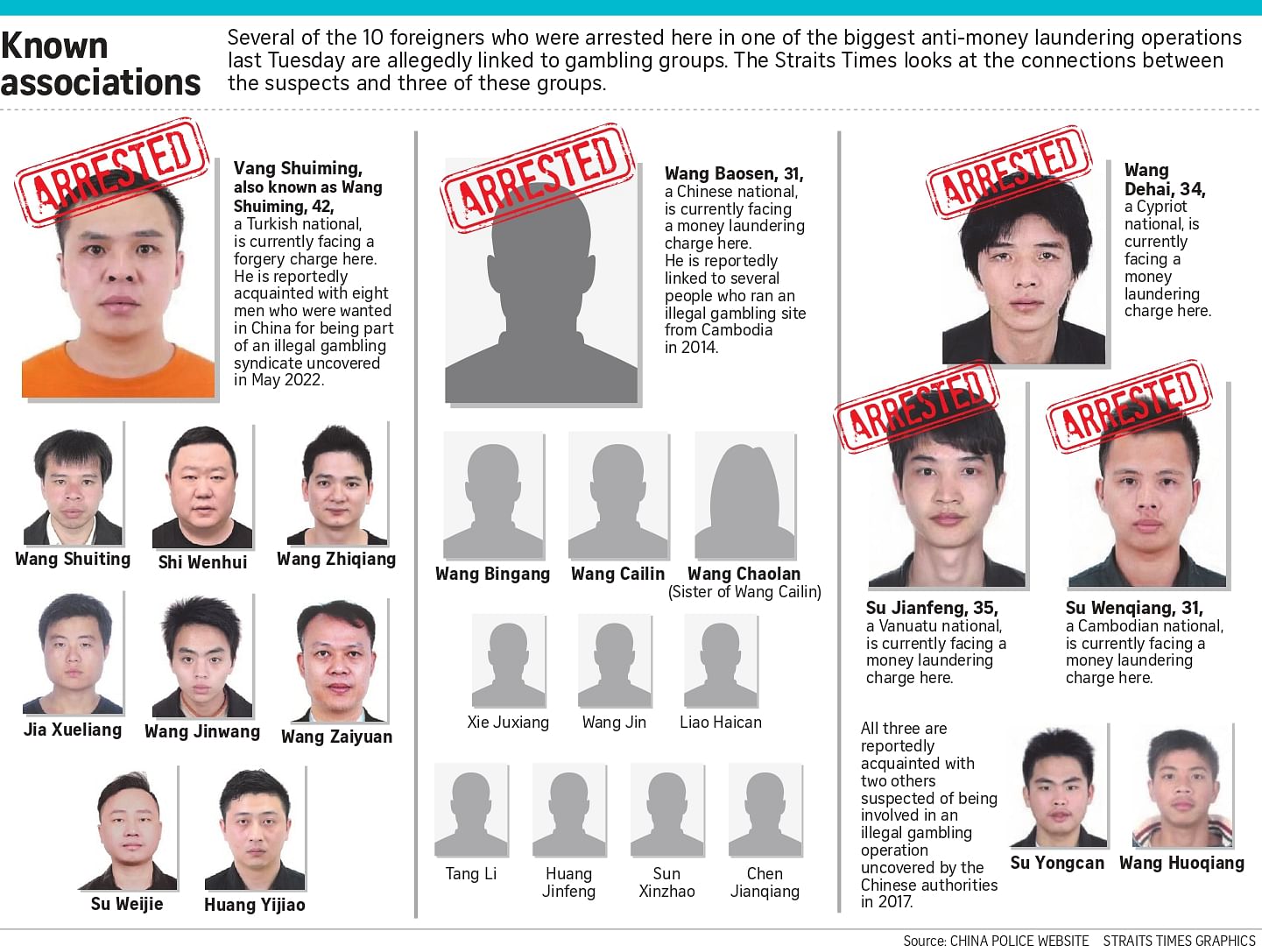Several foreigners arrested last Tuesday in Singapore’s biggest anti-money laundering operation are allegedly linked to individuals who were investigated in China for illegal gambling activities.
Vang Shuiming, who is facing a forgery charge here, is said to be a known associate of eight individuals on the run from the authorities in China, which had uncovered an illegal gambling syndicate in May 2022.
The eight fugitives – Wang Shuiting, Shi Wenhui, Wang Zhiqiang, Jia Xueliang, Wang Jinwang, Wang Zaiyuan, Su Weijie and Huang Yijiao – have been urged to return to assist in a probe which saw 131 people arrested in China and more than 10 million yuan (S$1.9 million) seized.
Vang, who is also known as Wang Shuiming, is a 42-year-old Turkish national. He was among the nine men and one woman, aged 31 to 44, who were arrested in Singapore in an islandwide operation that involved more than 400 officers.
A second individual arrested here – Wang Baosen, 31 – is allegedly linked to Wang Bingang, 34, and Wang Cailin, 36.
According to media reports, the three Chinese nationals were investigated by the Chinese authorities for their roles in operating illegal gambling sites.
Baosen, who is in remand here and facing a money laundering charge, is said to have been a member of the same group as Bingang and Cailin.
Chinese media outlet Shi Chang Xin Bao reported in 2013 that Bingang and Cailin were in their 20s when they launched a gambling website which offered games like blackjack and baccarat and provided sports and e-sports betting services.
Their business grew quickly and in 2014, they moved the operations to the city of Bavet, in Cambodia, which is near the border with Vietnam.
Soon after they launched the site Hongli300, the group expanded their team aggressively, hiring and recruiting ethnic Chinese people to fill roles in graphic design, customer service and finance management.
The media in China said Bingang and Cailin also recruited family members and used their bank accounts to hold illicit funds acquired through the illegal gambling site.
According to reports, others involved in the operations included Xie Juxiang, Wang Jin, Liao Haican, Tang Li, Huang Jinfeng, Sun Xinzhao, Chen Jianqiang and Wang Chaolan, who is Cailin’s sister.
The illegal gambling site Bingang and Cailin ran was shut down around October 2014. It was churning about 980 million yuan in various transactions at the time.
In 2015, a district court in China fined and sentenced the two men to three years’ jail for running the illegal site. Several other members of the gang were also jailed.
Baosen had also been investigated in the same probe.
Another gambling group
Three other suspects here facing a money laundering charge each – Cypriot national Wang Dehai, 34; Vanuatu national Su Jianfeng, 35; and Su Wenqiang, 31, a Cambodian national – are allegedly linked to another gambling group in China.
According to media reports, they are known associates of Su Yongcan, 32, and Wang Huoqiang, 29, who were reported to be on the run in 2018.
The two men were among 72 individuals the authorities in China investigated in 2017 as they clamped down on illegal gambling activities.
Online gambling is illegal in China, but it grew at an astonishing rate amid the Covid-19 pandemic.
In 2021, China’s Ministry of Public Security said police probed more than 17,000 cases of cross-border gambling and arrested more than 80,000 suspects in cases that involved over $151 billion in illegal transactions.
It also smashed more than 2,200 online gambling platforms, 1,600 illegal payment platforms and underground banks, and 1,500 gambling promotion platforms that same year.
The 10 individuals arrested in Singapore were charged last Wednesday with offences including forgery and money laundering.
They hold foreign passports from countries such as China, Turkey and Cambodia, but are said to have originated from Fujian, China.
Another 12 are assisting in investigations here, while eight others are on the run and have been placed on a wanted list.
The police here have seized, frozen or issued prohibition of disposal orders for about $1 billion in assets in relation to the case, including 105 properties as well as cars, cash and luxury goods.
